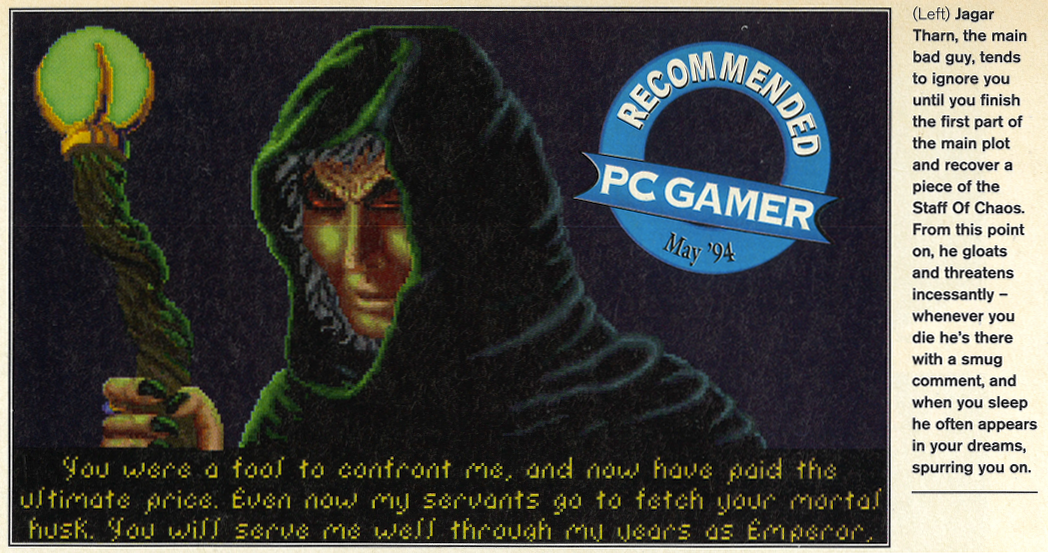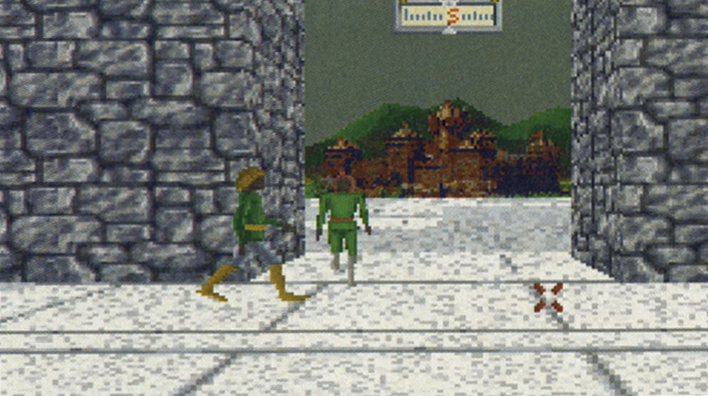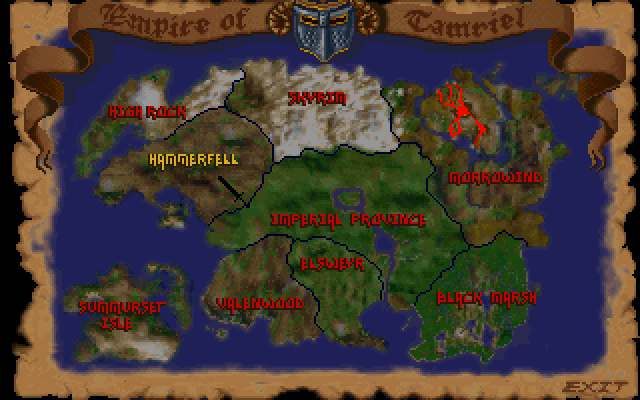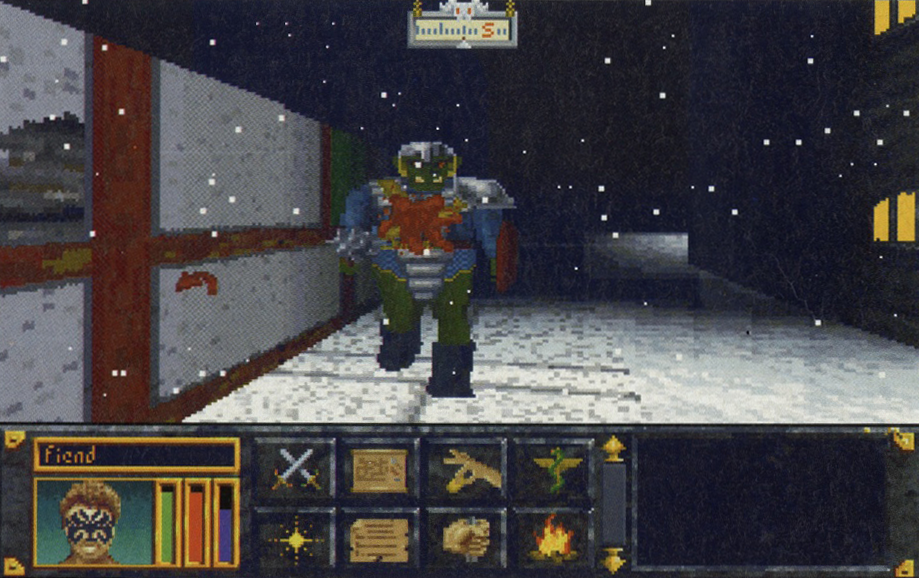Our Verdict
The first fantasy RPG since Ultima Underworld 2 that's really worth playing.
PC Gamer's got your back
To celebrate the 30th anniversary of The Elder Scrolls, we're publishing our original reviews of each main game in the series from our archives. This review first ran in PC Gamer UK issue 6, back in April 1994.
Reading the review now, it's clear just how many of the core pillars of The Elder Scrolls series first appeared in Arena. That you can essentially ignore the main quest in favour of your own fun is still one of the primary joys of the series. Here it even elicits a word of caution for certain types of players—"because you're given so much freedom, you may find it all a bit pointless," Andy warns. "Arena is a game that lets you decide what to do—it never forces you down any path."

Developer Bethesda Softworks
Minimum system 25 Mhz, 386, VGA & 4Mb RAM
Recommended 486DX, 8Mb RAM
Sound support All major cards
Release date March 25, 1994
Virtually all computer RPGs fall down when you compare them to their paper and pencil counterparts. Whether you play a scheming rogue or a heroic knight, you end up having to do much the same things and acting in much the same way, because there's no room to stray from the preprogrammed plot. Not only does this limit the game's potential, it somewhat defeats the point of a role-playing game in the first place. With The Elder Scrolls: Arena, however, Bethesda Softworks is attempting to surmount this obstacle—the game gives you a huge world to play with, and in it you can do pretty much as you wish. Although there's a main plot (the Emperor has been betrayed and imprisoned in an alien dimension by Jagar Tharn, his Imperial Battle Mage, and you must find the eight pieces of the Staff Of Chaos that are scattered across the lands of Tamriel in order to rescue him), there's nothing holding you to it. You can sneak around cities at night, break into people's houses (and then avoid the City Guard), sell your services to local rulers (and undertake missions and quests for them), or just wander around the place, discovering forgotten tombs and crumbling ruins. The main plot involves 16 progressively difficult quests and a conclusion, but there are over 400 other dungeons, cave systems and ruins to explore, and as many small adventures and tasks that you can take on as well.
The game starts in traditional style, with a character generation section. There are 18 classes in all to select from, divided into thieves, warriors, mages and suchlike. In addition, there are eight races, each with their own particular strengths and weaknesses. Once you've created your characters, the game begins in the dungeons under the Imperial Palace, where you have been imprisoned after Tharn's coup. With the help of the spirit of your dead teacher, Ria Silmane, you escape, and from here you're pretty much on your own.
Arena is a first-person perspective game, along the lines of the Ultima Underworld series, and uses a similarly intuitive mouse-based interface. You gain experience from killing monsters, exploring and so on. Going up an experience level increases your characters' attributes, as well as hit points, various special abilities that depend on your class/rate and combat skills.

The combat system itself, while simple to use, is better than most. There are four different types of attacks available, and each has a different chance to hit and inflicts a different amount of damage. While not ideal by any means, it does go some way to relieving the unfortunately repetitive hack-hack-hack fights common to most other first-person RPGs, and introduces some (albeit rudimentary) tactics to the proceedings.
The magic system, however, is one of Arena's key strengths. Depending on your class, your character's intelligence is multiplied by a given number, determining the maximum number of spell points at your disposal. Each spell has a base cost in spell points, which is divided by your level to calculate how many points it costs for you to cast. This rather clever system avoids having levels of spells, but enables higher level characters to easily cast more powerful spells, as well as a greater number of less powerful incantations. But the best feature of the lot is the Spellmaker. By visiting the Mages' Guild you can design and create your own spells via a simple series of easy-to-read menus. This is a work of sheer genius—you'll never be happy with a set list of spells again, I can tell you.
The combat system, while simple to use, is better than most—and provides four different modes of attack
With such a list of top features, Arena is a fine game indeed, but it does have some down points. The graphics, while excellent in some parts, are not of the highest resolution. In addition, there are some weird oversights, especially the way the 3D engine seems to cut off the top of single-storey buildings (ie, they have no roof). Likewise, the sound is variable, with some excellent spot effects and atmospheric monster sounds, but some horrible 'medieval' music and repetitive effects that soon begin to grate.

The biggest problems, though, lie in the gameplay itself. First, probably due to the size of the gameworld, character interaction is minimal. Second, because the game is so open and because you're given so much freedom, you may find it all a bit pointless. Similar in some ways to the Sim games from Maxis or David Braben's Frontier, Arena is a game that lets you decide what to do—it never forces you down any path.
Finally, a word of warning. Although the minimum system claimed for Arena is a 386, it really isn't worth playing unless you have a 486 or better – the graphics are just too slow to be playable on anything less. However, for all its faults this is still one of the best first-person perspective RPGs around. If Bethesda speed up the graphics and increase the character interaction, the next Elder Scrolls could be a classic.
The first fantasy RPG since Ultima Underworld 2 that's really worth playing.


